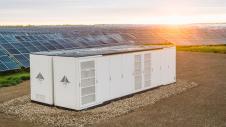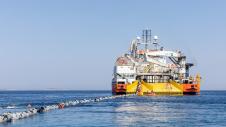Greece's Motor Oil and Terna Energy advanced plans yesterday to develop the country's first offshore wind farm amidst significant challenges faced by the sector.
In an industry that many consider the future of renewable energy, doubts are increasingly clouding offshore wind projects with investments being cancelled across Europe and elsewhere across the world.
Challenges Facing Offshore Wind
A significant setback occurred in wind power late last year when Sweden cancelled 13 offshore wind licenses, citing national defense concerns, while shortly afterwards, Shell withdrew from new offshore investments. Further blows have been dealt US President Donald Trump whose first actions focused on halting support for new offshore wind farms, prompting a sharp sell off of shares in European offshore wind developers that took place just a few days ago.
Greece’s Pilot Offshore Projects
In Greece, pilot offshore projects are progressing, including one near Alexandroupolis by Public Power Corporation (PPC) and a joint venture between Motor Oil and Terna Energy. Recently, the Hellenic Competition Commission approved the joint acquisition of "Aioliki Provata Traianoupoleos", the company owned by the joint venture that holds the rights to develop a pilot 400 MW offshore wind farm in the sea area off Alexandroupolis in the country's north.
Yesterday, it was announced that Motor Oil’s subsidiary, Motor Oil Renewable Energy (MORE), completed its acquisition of a 50% stake in Aioliki Provata Traianoupoleos. According to a joint press release issued by the companies, “this pioneering project, set for completion by the end of this decade, will be the first of its kind in Greece, contributing significantly to the success of the National Offshore Wind Development Program.”
Policy Remains Steady Amid Uncertainty
Despite the uncertainty surrounding the sector, policy goals remain unchanged in both Europe and Greece. The National Energy and Climate Plan (NECP) prepared by the Ministry of Energy targets 1.9 GW of offshore wind capacity by 2030, with 600 MW from the two pilot projects led by Motor Oil/Terna Energy and PPC.
However, market experts express doubts about whether Greece will hit the 1.9 GW target by 2030. Furthermore, government sources suggest that talk in Europe about revising green transition targets could impact offshore wind goals, particularly after Germany’s upcoming elections on February 23.
Local Resistance Slows Progress
Preparations for offshore wind installations in Greece are progressing but local opposition to the projects is slowing things down.
Recently, the Ministry of Culture finalized six marine areas where the first offshore wind units may be located. These locations include Zakros (near Sitia), Gyaros, Agioi Apostoloi in Evia, the northern Patraikos Gulf (between Antirrio and the Aetoliko lagoon), a sea area near Rhodes (south of Prasonisi), and Donoussa.
National Security Considerations
National security concerns are also affecting these investments. Last week, Energy Minister Theodoros Skylakakis informed parliament that offshore wind farm installations occur only in locations approved by the Hellenic National Defense General Staff (GEETHA). If GEETHA deems a location unsuitable, turbines are not installed to ensure defense systems are not compromised, he said.
The minister emphasized GEETHA’s role in evaluating potential impacts on national defense systems, addressing concerns raised by lawmakers regarding Sweden’s cancellation of offshore wind farms for national security reasons.
By balancing energy ambitions with national security and environmental considerations, Greece aims to lead the way in sustainable offshore wind development despite the challenges, the minister said.









